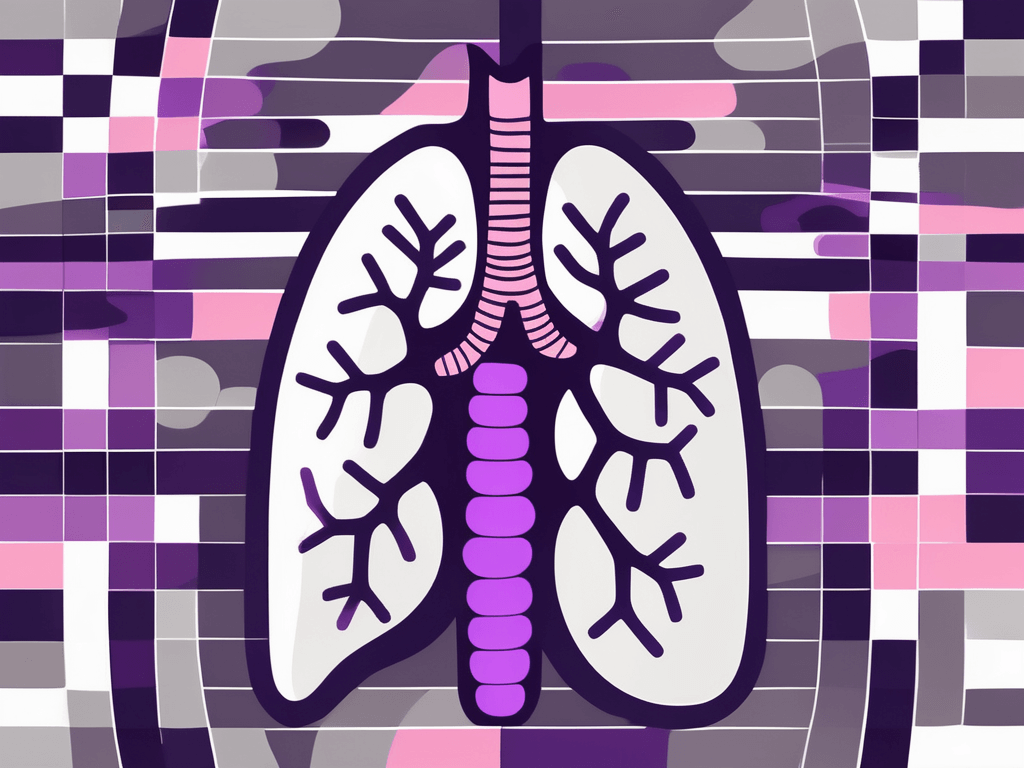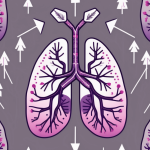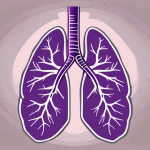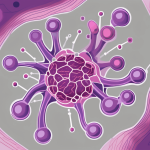ALK fusion oncogene positive Non-Small Cell Lung Cancer (NSCLC) represents a distinct and significant subset of lung cancer characterized by a genetic mutation that drives abnormal cell growth in the lungs. Accounting for 3-7% of NSCLC cases, this subtype predominantly affects younger individuals and non-smokers, presenting unique clinical features and treatment challenges. Diagnosis relies on specialized testing methods like FISH, IHC, and PCR to identify the ALK fusion oncogene, crucial for guiding targeted therapy options. The advent of ALK inhibitors has transformed treatment, offering improved survival rates and quality of life for patients. However, resistance to these therapies poses an ongoing challenge, necessitating continuous research and clinical trials to find novel treatments and overcome resistance mechanisms. Despite these hurdles, the prognosis for ALK fusion oncogene positive NSCLC patients has significantly improved, underscoring the importance of accurate diagnosis, personalized treatment plans, and comprehensive support systems for patients navigating this condition.
Non-small cell lung cancer (NSCLC) is a complex disease with different variants, one of which is anaplastic lymphoma kinase (ALK) fusion oncogene positive NSCLC. This type of lung cancer is characterized by the presence of a genetic mutation known as the ALK fusion oncogene. In this article, we will explore various aspects of ALK fusion oncogene positive NSCLC, including its introduction, role in cancer development, diagnosis methods, treatment options, clinical trials, prognosis, challenges, and patient support resources.
Introduction to ALK Fusion Oncogene Positive Non-small Cell Lung Cancer
Lung cancer is a significant health concern worldwide, and ALK fusion oncogene positive non-small cell lung cancer (NSCLC) represents a distinct subgroup of this disease. This variant occurs when the anaplastic lymphoma kinase (ALK) gene, responsible for cell growth and division, fuses with another gene, leading to abnormal cell growth and tumor formation in the lungs. ALK fusion oncogene positive NSCLC is relatively rare, accounting for approximately 3-7% of all cases of NSCLC. However, it is an important subtype to identify and understand due to its unique characteristics and potential treatment options.
When the ALK gene fuses with another gene, typically the echinoderm microtubule-associated protein-like 4 (EML4) gene, it creates a fusion protein known as ALK-EML4. This fusion protein has the ability to activate various signaling pathways within the cells, leading to uncontrolled cell growth and the formation of tumors in the lungs.
Patients with ALK fusion oncogene positive NSCLC often present with specific clinical features. They are typically younger, non-smokers or light smokers, and may have a history of never smoking. Additionally, they may exhibit adenocarcinoma histology, which is a type of lung cancer that originates in the glandular cells of the lungs. Diagnosing ALK fusion oncogene positive NSCLC requires specialized testing. The most common method is fluorescence in situ hybridization (FISH), which detects the presence of the ALK gene rearrangement. Other techniques, such as immunohistochemistry (IHC) and polymerase chain reaction (PCR), can also be used to confirm the presence of the fusion gene.
Once diagnosed, treatment options for ALK fusion oncogene positive NSCLC have significantly improved in recent years. Targeted therapies, such as ALK inhibitors, have shown remarkable efficacy in inhibiting the growth and spread of tumors in patients with this subtype of lung cancer. These medications specifically target the abnormal ALK-EML4 fusion protein, blocking its activity and halting the progression of the disease. However, like any other cancer, ALK fusion oncogene positive NSCLC can develop resistance to targeted therapies over time. This can occur due to various mechanisms, including secondary mutations in the ALK gene or activation of alternative signaling pathways. Ongoing research aims to identify strategies to overcome resistance and improve long-term outcomes for patients with this subtype of lung cancer.
In conclusion, ALK fusion oncogene positive NSCLC is a distinct subtype of non-small cell lung cancer characterized by the fusion of the ALK gene with another gene, leading to abnormal cell growth and tumor formation in the lungs. Diagnosis requires specialized testing, and targeted therapies have revolutionized the treatment landscape for this disease. Ongoing research continues to explore new treatment strategies and overcome resistance mechanisms, offering hope for improved outcomes for patients with ALK fusion oncogene positive NSCLC.
Understanding the Role of ALK Fusion Oncogene in Non-small Cell Lung Cancer
The ALK fusion oncogene plays a crucial role in the development and progression of non-small cell lung cancer (NSCLC). NSCLC is the most common type of lung cancer, accounting for approximately 85% of all cases. It is a complex disease with various genetic alterations contributing to its pathogenesis. ALK, which stands for anaplastic lymphoma kinase, is a gene that encodes a receptor tyrosine kinase. Normally, ALK is involved in the development and maintenance of the nervous system. However, in some cases, the ALK gene undergoes a fusion event with another gene, resulting in the formation of an abnormal fusion oncogene.
The fusion oncogene arises due to chromosomal rearrangements, where a portion of the ALK gene fuses with another gene, often from a different chromosome. This fusion event leads to the production of a chimeric protein with constitutive kinase activity. The abnormal kinase activity of the fusion protein disrupts normal cell signaling pathways, leading to uncontrolled cell division and tumor growth.
ALK fusion oncogene-positive NSCLC represents a distinct molecular subtype of the disease. It is more commonly found in younger patients, non-smokers, and those with adenocarcinoma histology. The identification of ALK fusion oncogene in NSCLC has revolutionized the treatment landscape, as it has become a target for molecularly targeted therapies. Several ALK inhibitors have been developed and approved for the treatment of ALK-positive NSCLC. These inhibitors specifically target the abnormal kinase activity of the fusion protein, effectively blocking the signaling pathways that promote tumor growth. The use of ALK inhibitors has shown promising results in clinical trials, leading to improved progression-free survival and overall survival rates in ALK-positive NSCLC patients.
Despite the initial efficacy of ALK inhibitors, resistance mechanisms eventually emerge, limiting the long-term effectiveness of these targeted therapies. Resistance can arise through various mechanisms, including secondary mutations in the ALK gene, activation of alternative signaling pathways, and tumor heterogeneity. Understanding the molecular mechanisms underlying ALK fusion oncogene-positive NSCLC and its resistance to targeted therapies is of utmost importance. Researchers are actively investigating the signaling pathways involved in ALK fusion oncogene-driven tumorigenesis, as well as the mechanisms of resistance. This knowledge will aid in the development of novel therapeutic strategies to overcome resistance and improve patient outcomes.
In conclusion, the ALK fusion oncogene plays a critical role in the development and progression of non-small cell lung cancer. Its abnormal kinase activity disrupts normal cell signaling pathways, leading to uncontrolled cell division and tumor growth. The identification of ALK fusion oncogene-positive NSCLC has paved the way for the development of targeted therapies, such as ALK inhibitors. However, resistance mechanisms pose a challenge to the long-term effectiveness of these treatments. Ongoing research aims to unravel the intricate molecular mechanisms underlying ALK fusion oncogene-positive NSCLC and resistance, with the ultimate goal of improving patient outcomes.
· Epidemiology and prevalence of ALK fusion oncogene positive non-small cell lung cancer : ALK fusion oncogene positive NSCLC is relatively rare, accounting for approximately 3-5%of all NSCLC cases. It is most commonly found in younger patients, non-smokers, and those with adenocarcinoma histology. Though its prevalence is low, advancements in genetic testing have improved the detection and diagnosis of this subtype.
· Diagnostic methods for detecting ALK fusion oncogene in non-small cell lung cancer: Accurate diagnosis plays a vital role in identifying ALK fusion oncogene positive NSCLC. Several diagnostic methods are available, including molecular testing and immunohistochemistry. These techniques help identify genetic mutations and the presence of ALK fusion oncogene, guiding treatment decisions.
· Treatment options for ALK fusion oncogene positive non-small cell lung cancer: The emergence of targeted therapies has revolutionized the management of ALK fusion oncogene positive NSCLC. Medications known as ALK inhibitors specifically target the ALK fusion protein, inhibiting its function and effectively controlling the growth of cancer cells. These targeted therapies not only improve survival outcomes but also minimize the side effects associated with traditional chemotherapy.
· Targeted therapies and ALK inhibitors in the management of non-small cell lung cancer: Targeted therapies, such as ALK inhibitors, have shown remarkable efficacy in treating ALK fusion oncogene positive NSCLC. These drugs work by blocking the activity of the abnormal ALK protein, preventing cancer cells from growing and dividing. ALK inhibitors have demonstrated significant response rates and prolonged progression-free survival, offering new hope for patients with this specific type of lung cancer.
· Clinical trials and advancements in ALK fusion oncogene positive non-small cell lung cancer: Clinical trials continue to play a critical role in advancing the treatment landscape for ALK fusion oncogene positive NSCLC. These trials investigate new therapies, combination treatments, and potential biomarkers that can predict treatment response. Participation in clinical trials provides patients with access to cutting-edge treatments and contributes to the collective knowledge in the field.
· Prognosis and survival rates inpatients with ALK fusion oncogene positive non-small cell lung cancer: Prognosis for patients with ALK fusion oncogene positive NSCLC has significantly improved with the advent of targeted therapies. Studies have shown that patients receiving ALK inhibitor treatment experience longer survival rates compared to traditional chemotherapy. However, individual prognosis may vary depending on the stage of cancer at diagnosis and the specific genetic profile of the tumor.
· Challenges and future directions in the treatment of ALK fusion oncogene positive non-small cell lung cancer : While targeted therapies have greatly improved outcomes for ALK fusion oncogene positive NSCLC, challenges still exist. Resistance to ALK inhibitors can develop over time, requiring alternative treatment options and strategies. Ongoing research aims to overcome these challenges and develop more effective therapies to combat this disease.
Patient Perspectives and Support Resources for Individuals with ALK Fusion Oncogene Positive Non-small Cell Lung Cancer
Dealing with a lung cancer diagnosis can be overwhelming, but support is available for individuals with ALK fusion oncogene positive NSCLC. Patient support groups, online communities, and organizations dedicated to lung cancer provide valuable resources, information, and a platform for sharing experiences. Connecting with others facing similar challenges can offer emotional support and help navigate the journey.
In conclusion, ALK fusion oncogene positive NSCLC is a distinct form of lung cancer that requires targeted treatment approaches. Advances in diagnostic methods, the development of ALK inhibitors, and ongoing research through clinical trials offer hope for improved outcomes. By combining medical breakthroughs with patient support resources, we can continue to make progress in the fight against ALK fusion oncogene positive NSCLC.






